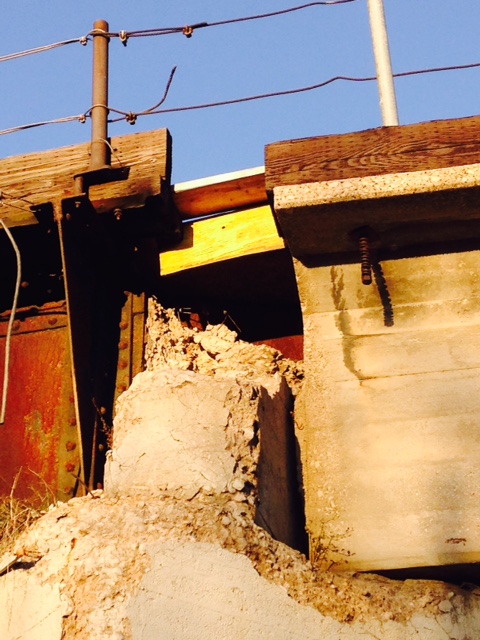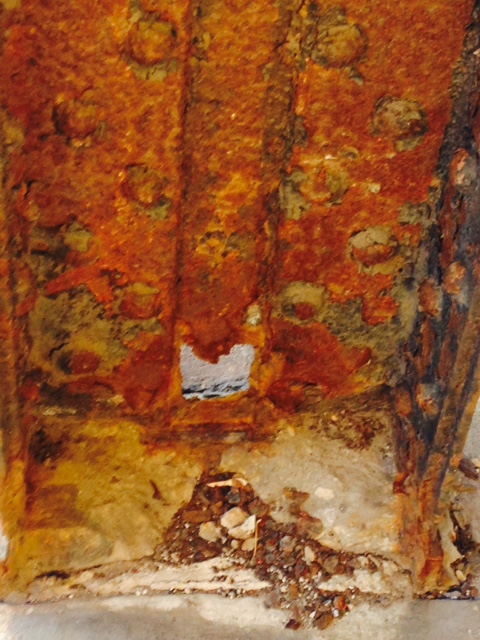Trains Carrying Oil Endanger Us
Oil train traffic has risen 5000% and often relies on crumbling train bridges.
In light of two train derailments in Wisconsin over the weekend and one on Monday in Iowa, the need for effective railroad safety regulations has never been more urgent or self-evident. What is not evident is the safety of our nation’s railroad infrastructure because the railroads continue to withhold important safety inspection information from our communities and first responders.
Since 2008, oil train traffic has increased by over 5,000 percent, largely due to increased production of Bakken oil from North Dakota. Bakken crude oil is highly combustible and sinks to the bottom of waterways, making clean-up and restoration efforts very difficult.
In the Milwaukee River Basin, Canadian Pacific operates a major rail route where combustible crude oil is being transported through major urban areas, crosses our local rivers and creeks at least 36 times and runs parallel to our rivers for miles. These railways have become “virtual pipelines” for hazardous fuels and ultimately endanger the health of our water and our communities. A spill of crude oil into the rivers could cause long-lasting, if not permanent, damage to fish populations and other aquatic life, and threaten Lake Michigan, our drinking water source.
Adding to the concerns is seemingly inadequate maintenance by railroad owners and a lack of federal oversight of safety inspections by the Federal Railroad Administration (FRA). As such, the federal government estimates the U.S. will see an average of 14 oil train accidents per year over the next 5 years. This is unacceptable.
The inherent risk in carrying hazardous fuels over waterways and through communities is a significant part of the problem, but the lack of transparency from railroad companies is another. Canadian Pacific has regularly refused to supply inspection reports to the City of Milwaukee on “Old Rusty”, the nearly 100-year-old rail bridge at 1st and Pittsburgh. Its steel girders are so corroded there are visible holes, while combustible oil trains pass just feet from many homes and businesses in the Fifth Ward. A train carrying crude oil that passed through downtown Milwaukee two years ago went on to Lac Megantic, Quebec where it derailed and exploded, killing 47 people and destroying 30 downtown buildings.
And Old Rusty is just one of more than 100,000 rail bridges in the U.S. that the public knows little or nothing about–not only with respect to the structural integrity of the tracks but also the kinds of hazardous materials being carried in the tankers. Waterkeeper Alliance, our umbrella organization, just released a report documenting that half of 250 oil train bridges inspected by Waterkeepers across the U.S. showed signs of considerable deterioration. Federal law currently leaves inspection of railroad infrastructure to the railroad owners with little or no government oversight.
Thankfully, Wisconsin Senator Tammy Baldwin is leading the charge for improved railroad safety, and has authored Federal Legislation—the Crude by Rail Safety Act—that would require new safety regulations to mitigate the volatility of gasses in Bakken crude oil and immediately halt the use of older, “thin-skinned”, high-risk tank cars like the kind that spilled ethanol into the Mississippi River last Saturday. Wisconsin lawmakers also recently introduced legislation in response to increasing concerns of shipping crude oil by rail. Their legislation is modeled after a law implemented in Minnesota last year that allocates funding for state rail safety inspectors, trains first responders, and requires railroads to have emergency prevention and response plans.
The Milwaukee River flows cleaner today than it has in many decades. It is unthinkable that after starting to recover from decades of legacy pollution, our rivers are now under increasing threat from a crude oil spill that could erase many of our efforts. We can’t afford to endanger the health of our waterways or the safety of our communities while railroads refuse to disclose important safety information to our cities and first responders. The FRA also needs to be empowered to adequately regulate this industry.
Unless changes are made to address rail safety, it is not a question of if a disastrous spill will occur in Milwaukee; it is a question of when. Our communities and waterways deserve better. Tell Congress and our State Legislature that it’s past time to act on rail safety reform.
Op-Ed
-
Wisconsin Candidates Decry Money in Politics, Plan to Raise Tons of It
 Dec 15th, 2025 by Ruth Conniff
Dec 15th, 2025 by Ruth Conniff
-
Trump Left Contraceptives to Rot; Women Pay the Price
 Dec 8th, 2025 by Dr. Shefaali Sharma
Dec 8th, 2025 by Dr. Shefaali Sharma
-
Why the Common Council’s Amended Budget is Good Policy for Milwaukee
 Nov 20th, 2025 by Alds. Marina Dimitrijevic and Russell W. Stamper, II
Nov 20th, 2025 by Alds. Marina Dimitrijevic and Russell W. Stamper, II
Transportation
-
Congestion Pricing Cuts Air Pollution in New York City
 Dec 14th, 2025 by Jeff Wood
Dec 14th, 2025 by Jeff Wood
-
FTA Tells Milwaukee to Crack Down on Fare Evasion — Even Where Fares Don’t Exist
 Dec 12th, 2025 by Graham Kilmer
Dec 12th, 2025 by Graham Kilmer
-
Will GOGO’s Bus Service Ever Get Going?
 Dec 9th, 2025 by Jeramey Jannene
Dec 9th, 2025 by Jeramey Jannene




















The safety regulations on the brakkan crude oil trains are very important. They should be implemented as quickly as reasonably possible. The details of both the regulations passed in spring and the future regulations being proposed can be debated regarding how strict they should be.
The thing that boggles my mind though are the people who feel so passionately about oil transport by rail yet oppose the much safer transportation via pipeline. Several pipeline proposals are in the works or planned for the future but are bitterly opposed. You need one or the other, oil isn’t going to magically go away.
As the young child on trial for murdering his parents begged for clemency from the court cried, “Be merciful with me, as I am an orphan”, so too those protesters who opposed the XL Keystone pipeline are now opposing transporting oil by rail. Keystone will be a state-of-the-art pipeline with all the safeguards of the 21st Century (think drones, nano-devices, graphene, and the like) and to oppose it is silly. Not only is a pipeline the safest way to transport liquids, it is the least expensive. While there are tens of thousands of miles of pipeline in North America (Yes, Virginia, even in Milwaukee), XL Keystone pipeline will be the best-of-the-best. I look forward to its eventual completion.
It’s not just the Keystone XL. There are numerous projects that are proposed or in the planning stages. Some specifically targeting the very oil that rolls through Milwaukee on these trains.
All pipelines eventually fail and leak and the company that owns them goes bankrupt if there is a massive cleanup involved leaving taxpayers and private property owners with the problem. Keystone XL was proposed by a foreign oil company in Canada for shipping tar sand oil to world markets and the highest bidder. Canadian tar sand oil along with Braaken Crude oil from North Dakota cost $75 to $100/barrel to produce out of the ground. Current world prices are expected to remain below $50/barrel for a number of years. Saudi Arabia production cost is about $5/barrel and they have been producing 10 million barrels a day to flood world markets and drive tar sand and frack oil from ND and other states, along with Russian oil out of the business.
The Saudi strategy has been working and thousands of workers and oil producers have been shut down in the USA and Canada. In coming years the need for domestic oil may swing back again. That is why the USA and WI need an overall energy strategy for long term in this country. If you add in defense cost to a gallon of gasoline it is about $500/gal. of which 95% of that is on the nation’s credit card as part of an immoral intergenerational theft from our children and grandchildren to pay off with $8/hr. jobs in the distant future.
As a long term strategy for energy diversification we need to initiate a carbon tax on all fossil fuels, stop export of coal reserves to China, add tax credits and elimination of sales tax on local produced materials and services. Programs would be initiated to maximize consumer owned energy efficiency, solar, energy storage and load control on time of use rates, to redesign and remodel all building stock. This would reduce fossil fuel consumption by 50% in a few decades time. In Wisconsin, this approach would save consumers of $7 Billion annually and create thousands of jobs in the state and use local materials and services with removal of the sales tax and other incentives including Focus on Energy involvement. Millions of jobs would be created in the USA and save consumers trillions annually.
This would also have the effect of greatly reducing our need for Mideast oil and meddling in wars and the huge immoral hidden cost and damages that we incur upon our children and grandchildren.
The carbon taxes would support infrastructure reconstruction of bridges, roads, and maximize mass transit alternatives, and bike and recreation trails. A portion of carbon taxes should be applied to pay down the nation’s debt load.
This is the alternate strategy we have to take instead of just viewing the urge of a pipeline and addicted thirst for oil to fuel ones’ personal want as a solution.
Tammy Baldwin could get behind the Keystone Pipeline and stop using rail but she wont because one of her big money persons George Soros owns a lot of the rail cars. Follow the money.
Pipelines alone won’t eliminate oil-by-rail. Some of the oil is going by rail because it is going to refineries not reached by existing or proposed pipelines. Some types of oil are easier to ship by rail than by pipeline.
Also, it is easier to quickly scale up oil-by-rail than to build pipelines.
I’m not trying to argue for or against any pipeline specifically or pipelines generally, just noting that it’s not quite as simple as oil is only moving by rail because Pipeline X or Y does not exist.
XL Keystone Pipeline is a foreign owned project that would cross hundreds of private property owners and place liability upon them for allowing the pipeline on their property. The economics are no longer viable for tar sand oil with the abundance of cheaper oil that is available in the near term. As barrel price increase in the future, and it will, a pipeline project will reappear.
Underground pipelines have been used for 65 years in the USA and many are in poor condition and at the end of their lives.
The USA is nearly 4% of the worlds population and consumes 40% of the planet’s available energy. One half of available fossil fuel energy on the planet has been consumed. This has also been the easiest to obtain form of energy. What remains if much more difficult and expensive to obtain. The Mideast is the only place on Earth with easy low cost oil in large quantities. Access to this oil comes with a high cost in defense spending. According to a 2004 DOE report, Saudi Arabia will no longer have oil for export by 2030 and will use what remains for their own domestic needs. The planet is on an unsustainable and dead end path when it comes to obtaining and consuming fossil fuels.
To avoid massive boom and bust cycles of the future, energy diversification is needed now with many alternatives that I have stated already. I am an elder so I get to enjoy the current boom cycle and low cost perhaps for the last time in my life. What I propose is for my children and grandchildren.